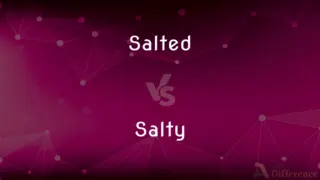Wit vs. Humour — What's the Difference?
Edited by Tayyaba Rehman — By Fiza Rafique — Updated on November 6, 2023
Wit involves clever verbal expression and quick thinking, while humor is a broader concept that encompasses anything that provokes laughter or amusement.

Difference Between Wit and Humour
Table of Contents
ADVERTISEMENT
Key Differences
Wit is a form of intelligent humor characterized by a quickness to comprehend what is amusing or subtle about a situation, and an ability to express it in a clever or insightful way. It often involves a play on words or an unexpected connection. Humor, on the other hand, is a more general quality that elicits laughter or amusement, whether through situations, language, or physical comedy, and does not necessarily require cleverness or quick thinking.
One might find wit in the clever banter of a skilled conversationalist, someone who can make astute observations with brevity and a sharpness of language. Humor could be found in a broad range of situations, from a slapstick comedy routine to a simple joke or comical situation, not always requiring the same intellectual engagement as wit.
Wit often has an element of surprise and brevity, striking quickly and sometimes with a biting or satirical edge. Humor is more about providing enjoyment and can range from light-hearted fun to dark comedy, encompassing a wide variety of tones and styles. It's less about the speed and more about the outcome—laughter.
Moreover, wit can be considered a component of humor, one of the ways to create it. While all wit is humorous, not all humor is considered witty. Wit is just one of the many avenues through which humor can be expressed.
Comparison Chart
Definition
Intellectual cleverness and quickness
Anything that provokes laughter or amusement
ADVERTISEMENT
Expression
Often verbal and concise
Can be verbal, visual, situational
Requirement
Intelligence, knowledge
Not necessarily requiring intellect
Tone
Can be biting, satirical
Ranges from gentle to dark
Duration
Quick and momentary
Can be sustained over time
Compare with Definitions
Wit
A quick and clever verbal retort.
His wit made the entire room burst into laughter.
Humour
Anything that causes laughter or amusement.
His sense of humour is quite infectious.
Wit
Intellectual agility in making humorous observations.
The author's wit shines through her satirical writing.
Humour
The quality of being amusing or comical.
The movie's humour appealed to both children and adults.
Wit
The ability to say something humorous in a clever way.
She charmed everyone with her sharp wit.
Humour
An instance of being funny or comical.
The cartoon added a bit of humour to the newspaper.
Wit
Mental sharpness and inventiveness used to create humor.
His wit was as quick as lightning.
Humour
A disposition to appreciate or express something funny.
She took the joke well, thanks to her good humour.
Wit
Wit is a form of intelligent humour, the ability to say or write things that are clever and usually funny. Someone witty is a person who is skilled at making clever and funny remarks.
Humour
A mode of entertainment that includes jokes or anecdotes.
Stand-up comedy is a popular form of humour.
Wit
The capacity for inventive thought and quick understanding; keen intelligence
She does not lack perception or native wit
He needed all his wits to figure out the way back
Humour
Humour (Commonwealth English) or humor (American English) is the tendency of experiences to provoke laughter and provide amusement. The term derives from the humoral medicine of the ancient Greeks, which taught that the balance of fluids in the human body, known as humours (Latin: humor, "body fluid"), controlled human health and emotion.
Wit
A natural aptitude for using words and ideas in a quick and inventive way to create humour
His caustic wit cuts through the humbug
Humour
The quality of being amusing or comic, especially as expressed in literature or speech
His tales are full of humour
Wit
Have knowledge
I addressed a few words to the lady you wot of
Humour
A mood or state of mind
Her good humour vanished
The clash hadn't improved his humour
Wit
That is to say (used to be more specific about something already referred to)
The textbooks show an irritating parochialism, to wit an almost total exclusion of papers not in English
Humour
Each of the four chief fluids of the body (blood, phlegm, yellow bile (choler), and black bile (melancholy)) that were thought to determine a person's physical and mental qualities by the relative proportions in which they were present.
Wit
The natural ability to perceive and understand; intelligence.
Humour
Comply with the wishes of (someone) in order to keep them content, however unreasonable such wishes might be
She was always humouring him to prevent trouble
Wit
Often wits Practical intelligence; shrewdness or resourcefulness
Living by one's wits.
Humour
Variant of humor.
Wit
Wits Sound mental faculties; sanity
Scared out of my wits.
Humour
(uncountable) The quality of being amusing, comical, funny.
She has a great sense of humour, and I always laugh a lot whenever we get together.
The sensitive subject was treated with humour, but in such way that no one was offended.
Wit
(Archaic) A person of exceptional intelligence.
Humour
(uncountable) A mood, especially a bad mood; a temporary state of mind or disposition brought upon by an event; an abrupt illogical inclination or whim.
He was in a particularly vile humour that afternoon.
Wit
The ability to express oneself intelligently in a playful or humorous manner, often in overturning audience expectations
A writer with a scintillating wit.
Humour
Any of the fluids in an animal body, especially the four "cardinal humours" of blood, yellow bile, black bile and phlegm that were believed to control the health and mood of the human body.
Wit
A person noted for this ability, especially in conversation
“My mother, the family wit and teaser, knew better than to joke about the disaster” (Donald Hall).
Humour
(medicine) Either of the two regions of liquid within the eyeball, the aqueous humour and vitreous humour.
Wit
Intelligent playfulness or humor in expression, as in speech, writing, or art
Novels known for their wit and inventiveness.
Humour
(obsolete) Moist vapour, moisture.
Wit
To be or become aware of; learn.
Humour
(transitive) To pacify by indulging.
I know you don't believe my story, but humour me for a minute and imagine it to be true.
Wit
To know.
Humour
Same as humor.
Wit
Sanity.
He's gone completely out of his wits.
Humour
A characteristic (habitual or relatively temporary) state of feeling;
Whether he praised or cursed me depended on his temper at the time
He was in a bad humor
Wit
The senses.
Humour
A message whose ingenuity or verbal skill or incongruity has the power to evoke laughter
Wit
Intellectual ability; faculty of thinking, reasoning.
Where she has gone to is beyond the wit of man to say.
Humour
(Middle Ages) one of the four fluids in the body whose balance was believed to determine your emotional and physical state;
The humors are blood and phlegm and yellow and black bile
Wit
The ability to think quickly; mental cleverness, especially under short time constraints.
My father had a quick wit and a steady hand.
Humour
The liquid parts of the body
Wit
Intelligence; common sense.
The opportunity was right in front of you, and you didn't even have the wit to take it!
Humour
The quality of being funny;
I fail to see the humor in it
Wit
Humour, especially when clever or quick.
The best man's speech was hilarious, full of wit and charm.
Humour
The trait of appreciating (and being able to express) the humorous;
She didn't appreciate my humor
You can't survive in the army without a sense of humor
Wit
A person who tells funny anecdotes or jokes; someone witty.
Your friend is quite a wit, isn't he?
Humour
Put into a good mood
Wit
Know, be aware of constructed with of when used intransitively.
You committed terrible actions — to wit, murder and theft — and should be punished accordingly.
They are meddling in matters that men should not wit of.
Wit
(Southern American English) with
Wit
To know; to learn.
Brethren, we do you to wit [make you to know] of the grace of God bestowed on the churches of Macedonia.
Thou wost full little what thou meanest.
We witen not what thing we prayen here.
When that the sooth in wist.
Wit
Mind; intellect; understanding; sense.
Who knew the wit of the Lord? or who was his counselor?
A prince most prudent, of an excellentAnd unmatched wit and judgment.
Will puts in practice what wit deviseth.
He wants not wit the dander to decline.
Wit
A mental faculty, or power of the mind; - used in this sense chiefly in the plural, and in certain phrases; as, to lose one's wits; at one's wits' end, and the like.
I will stare him out of his wits.
Wit
Felicitous association of objects not usually connected, so as to produce a pleasant surprise; also. the power of readily combining objects in such a manner.
The definition of wit is only this, that it is a propriety of thoughts and words; or, in other terms, thoughts and words elegantly adapted to the subject.
Wit which discovers partial likeness hidden in general diversity.
Wit lying most in the assemblage of ideas, and putting those together with quickness and variety wherein can be found any resemblance or congruity, thereby to make up pleasant pictures in the fancy.
Wit
A person of eminent sense or knowledge; a man of genius, fancy, or humor; one distinguished for bright or amusing sayings, for repartee, and the like.
In Athens, where books and wits were ever busier than in any other part of Greece, I find but only two sorts of writings which the magistrate cared to take notice of; those either blasphemous and atheistical, or libelous.
Intemperate wits will spare neither friend nor foe.
A wit herself, Amelia weds a wit.
But my five wits nor my five senses canDissuade one foolish heart from serving thee.
Wit
A message whose ingenuity or verbal skill or incongruity has the power to evoke laughter
Wit
Mental ability;
He's got plenty of brains but no common sense
Wit
A witty amusing person who makes jokes
Wit
A form of humor involving clever twists of language.
The playwright's wit entertained audiences for centuries.
Common Curiosities
Can humour be unintentional?
Yes, humour can be unintentional, arising from situations or actions that are unexpectedly amusing.
Is wit always appreciated?
Not always; wit can sometimes be too subtle or biting, and not everyone may appreciate its cleverness.
Can wit be prepared in advance?
Yes, wit can be prepared in advance, although it is often seen as most impressive when it is spontaneous.
What is wit?
Wit is a quick, intellectual form of humor, often involving wordplay.
Can humour be a coping mechanism?
Absolutely, many people use humour to cope with difficult situations.
Is sarcasm a form of wit?
Sarcasm is considered a form of wit that often has a mocking or ironic edge.
How is humour different from wit?
Humour is a broader term for anything that makes people laugh; wit is a specific type of humor that is quick and clever.
Is humour subjective?
Yes, what is humorous to one person may not be to another; it's highly subjective.
Does wit require a listener?
Wit often requires a listener to appreciate the cleverness of the remark.
Do all cultures value wit in the same way?
No, different cultures place varying degrees of value on wit in communication.
Can humour exist without laughter?
Yes, humour can be a gentle amusement or a recognition of irony, not always resulting in laughter.
Can wit be visual?
Wit is typically verbal, but visual wit can occur in mediums like cartoons or clever designs.
Is wit the same as a joke?
No, wit is more about a sharp and clever comment, while a joke is a structured attempt at humor.
Does humour have to be spoken?
No, humour can be visual, situational, or physical as well.
Can humour be found in everyday life?
Yes, humour is often derived from everyday situations and observations.
Share Your Discovery

Previous Comparison
Salted vs. Salty
Next Comparison
Automaton vs. RobotAuthor Spotlight
Written by
Fiza RafiqueFiza Rafique is a skilled content writer at AskDifference.com, where she meticulously refines and enhances written pieces. Drawing from her vast editorial expertise, Fiza ensures clarity, accuracy, and precision in every article. Passionate about language, she continually seeks to elevate the quality of content for readers worldwide.
Edited by
Tayyaba RehmanTayyaba Rehman is a distinguished writer, currently serving as a primary contributor to askdifference.com. As a researcher in semantics and etymology, Tayyaba's passion for the complexity of languages and their distinctions has found a perfect home on the platform. Tayyaba delves into the intricacies of language, distinguishing between commonly confused words and phrases, thereby providing clarity for readers worldwide.














































